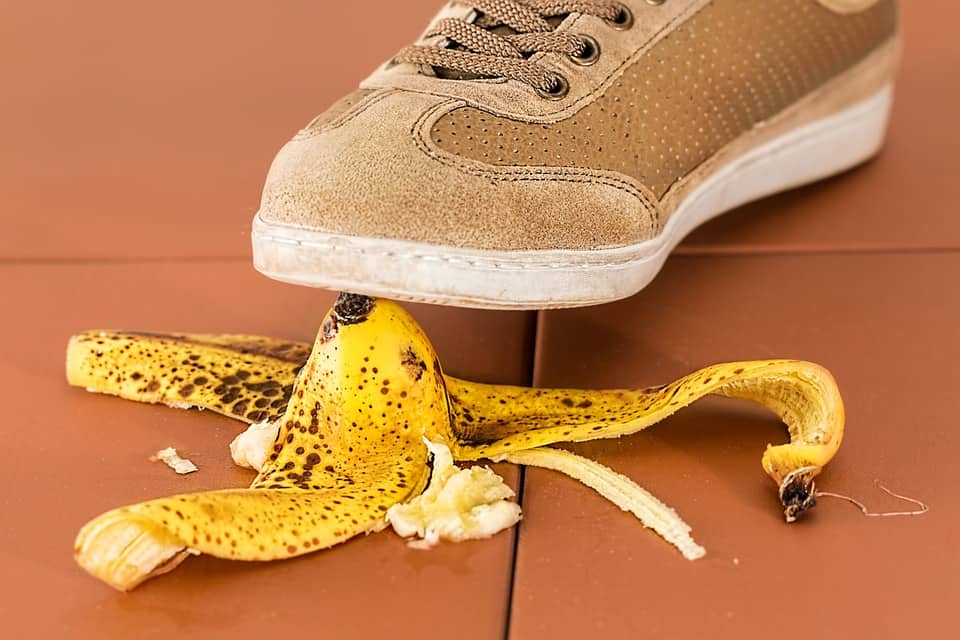Slip and Fall Injury Accidents
If you fall due to a “dangerous condition” (e.g., ice, trip hazard, standing water, etc.) on someone else’s property and are left with an injury that is long-lasting or interferes with your daily routine, the premise owner may be liable for the injuries you suffered.
But how do you know whether you have a personal injury case in the first place? How should it be handled? Do you need a personal injury lawyer to help you?
Here are some facts about slip and fall liability.
First, you are not alone. Thousands of people are injured in slip and fall accidents every year, some of which are very serious. The causes of these injury accidents range from dangerous flooring, tricky stairs, an unexpected change in elevation that leads you to trip, or an uneven area of ground. These are known as dangerous conditions.
Keep in mind that although you may be injured due to these dangerous conditions, property owners may not be held liable unless they had “notice” of the dangerous condition and (1) either had an opportunity to fix it, or (2) had an opportunity to warn you and others of the dangerous condition. To be legally responsible for the injuries you suffered from slipping and falling on someone else’s property, at least one of the following must be true:
- The owner of the premises or an employee must have caused the spill, worn or torn spot, or other slippery or dangerous surface or item to be underfoot.
- The owner of the premises or an employee must have known of the dangerous surface but done nothing about it.
- The owner of the premises or an employee should have known of the dangerous surface because a “reasonable” person taking care of the property would have discovered and removed or repaired it.
Some tricky wording (you may have noticed “should have” quite often) often leaves room for debate between attorneys for property owners and injury victims. Liability relies heavily on whether the property owner followed its’ own rules and guidelines and whether the property owner or its’ employees used common sense to recognize and fix a dangerous condition. A debate also hinges on what was “reasonable” considering the circumstances. It is often important to determine whether the owner makes regular and thorough efforts to keep the property safe and clean and whether such “inspections” occurred just prior to your injury accident.
Some things to consider when you are considering whether you should pursue your slip and fall injury claim and whether you need the help of a trained personal injury attorney with experience litigating premises liability cases:
- If you tripped over or slipped on an object that should not have been on the property (the “dangerous condition”), had the dangerous condition been there long enough that the owner should have known about it?
- Does the property owner have a regular procedure for examining and cleaning or repairing the premises? If so, what proof does the owner have of this regular maintenance?
- If you tripped over or slipped on an object on the ground, was there a legitimate reason for the object to be there?
- If there once had been a good reason for the object to be there but that reason no longer exists, could the object have been removed or covered or otherwise made safe?
- Was there a safer place the object could have been located, or could it have been placed in a safer manner, without much greater inconvenience or expense to the property owner or operator?
- Could a simple barrier have been created or a warning been given to prevent people from slipping or tripping?
- Did poor or broken lighting contribute to the accident?
Bear in mind that the notice requirement is a double-edged sword. The primary way the property owner will learn of a dangerous condition is through a visual inspection–in other words, they saw it on their property. Seeing the dangerous condition is enough to put the property owner on notice. However, if the dangerous condition was visible to the property owner, the property owner will argue that you should have seen it too and avoided it. In other words, the property owner will argue that you bear some or all of the responsibility for causing your injuries. This is called “contributory negligence”. It does not prevent you from recovering money for your injuries, but if a jury agrees with the property owner it will reduce the verdict in your favor.
For example, if you slip on water on a supermarket floor, a jury will be asked to determine whether the property owner was responsible for your injuries and whether you were contributorily negligent. Let’s say that a jury determines that your injury is worth $100,000 and that the property owner is 75% responsible and you are 25% contributorily negligent. The result of this verdict is that you will receive a verdict of $100,000 minus 25% ($25,000), for a net jury verdict of $75,000.
Because determining whether a property owner is legally responsible for a slip and fall injury is never absolutely determined until trial–both the property owner and injury victim will have arguments in their favor–many personal injury attorneys do not like representing slip and fall accident victims. These personal injury lawyers prefer cases where legal responsibility is determined, like rear-end car collisions, and the only issue they have to fight over is the value of the injured person’s injury. If they do take the rare slip and fall case, they are often lost or unmotivated to do the hard work needed to successfully prosecute these claims.
That is why you need an experienced slip and fall accident lawyer to help you. We have built a reputation in San Diego, Southern California, and the entire state of California as successful slip and fall accident lawyers who know how to build, document, and strengthen serious slip and fall accident cases. That reputation is known amongst other personal injury attorneys, many of whom regularly refer their slip and fall accident clients to our office due to our expertise. In addition, it is known by the insurance companies and lawyers for property owners who know that we will take these cases to trial and will be successful.
If you or a loved one have been injured in a slip and fall accident and you would like more information, contact us for a free consultation. We will make sure that none of your questions are unanswered and that you are informed about the legal process for slip and fall accident cases.…


